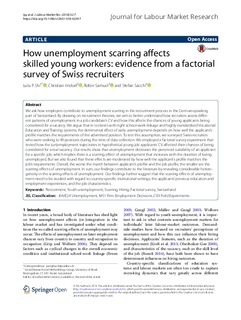| dc.contributor.author | Shi, Lulu. P. | |
| dc.contributor.author | Imdorf, Christian | |
| dc.contributor.author | Samuel, Robin | |
| dc.contributor.author | Sacchi, Stefan | |
| dc.date.accessioned | 2018-08-31T09:18:34Z | |
| dc.date.available | 2018-08-31T09:18:34Z | |
| dc.date.created | 2018-08-15T17:51:19Z | |
| dc.date.issued | 2018 | |
| dc.identifier.citation | Journal for Labour Market Research. 2018, 52 (7), . | nb_NO |
| dc.identifier.issn | 2510-5027 | |
| dc.identifier.uri | http://hdl.handle.net/11250/2560237 | |
| dc.description.abstract | We ask how employers contribute to unemployment scarring in the recruitment process in the German-speaking part of Switzerland. By drawing on recruitment theories, we aim to better understand how recruiters assess differ- ent patterns of unemployment in a job candidate’s CV and how this affects the chances of young applicants being considered for a vacancy. We argue that in contexts with tight school-work linkage and highly standardised Vocational Education and Training systems, the detrimental effect of early unemployment depends on how well the applicant’s profile matches the requirements of the advertised position. To test this assumption, we surveyed Swiss recruiters who were seeking to fill positions during the time of data collection. We employed a factorial survey experiment that tested how the (un)employment trajectories in hypothetical young job applicants’ CV affected their chances of being considered for a real vacancy. Our results show that unemployment decreases the perceived suitability of an applicant for a specific job, which implies there is a scarring effect of unemployment that increases with the duration of being unemployed. But we also found that these effects are moderated by how well the applicant’s profile matches the job’s requirements. Overall, the worse the match between applicant’s profile and the job profile, the smaller are the scarring effects of unemployment. In sum, our findings contribute to the literature by revealing considerable hetero- geneity in the scarring effects of unemployment. Our findings further suggest that the scarring effects of unemploy- ment need to be studied with regard to country-specific institutional settings, the applicants’ previous education and employment experiences, and the job characteristics. | nb_NO |
| dc.language.iso | eng | nb_NO |
| dc.publisher | SpringerOpen | nb_NO |
| dc.relation.uri | https://link.springer.com/article/10.1186/s12651-018-0239-7 | |
| dc.rights | Navngivelse 4.0 Internasjonal | * |
| dc.rights.uri | http://creativecommons.org/licenses/by/4.0/deed.no | * |
| dc.title | How unemployment scarring affects skilled young workers: evidence from a factorial survey of Swiss recruiters | nb_NO |
| dc.type | Journal article | nb_NO |
| dc.type | Peer reviewed | nb_NO |
| dc.description.version | publishedVersion | nb_NO |
| dc.source.pagenumber | 15 | nb_NO |
| dc.source.volume | 52 | nb_NO |
| dc.source.journal | Journal for Labour Market Research | nb_NO |
| dc.source.issue | 7 | nb_NO |
| dc.identifier.doi | 10.1186/s12651-018-0239-7 | |
| dc.identifier.cristin | 1602298 | |
| dc.relation.project | EC/H2020/15.0089, 649395 | nb_NO |
| dc.description.localcode | © The Author(s) 2018. This article is distributed under the terms of the Creative Commons Attribution 4.0 International License (http://creativecommons.org/licenses/by/4.0/) | nb_NO |
| cristin.unitcode | 194,67,25,0 | |
| cristin.unitname | Institutt for sosiologi og statsvitenskap | |
| cristin.ispublished | true | |
| cristin.fulltext | original | |

